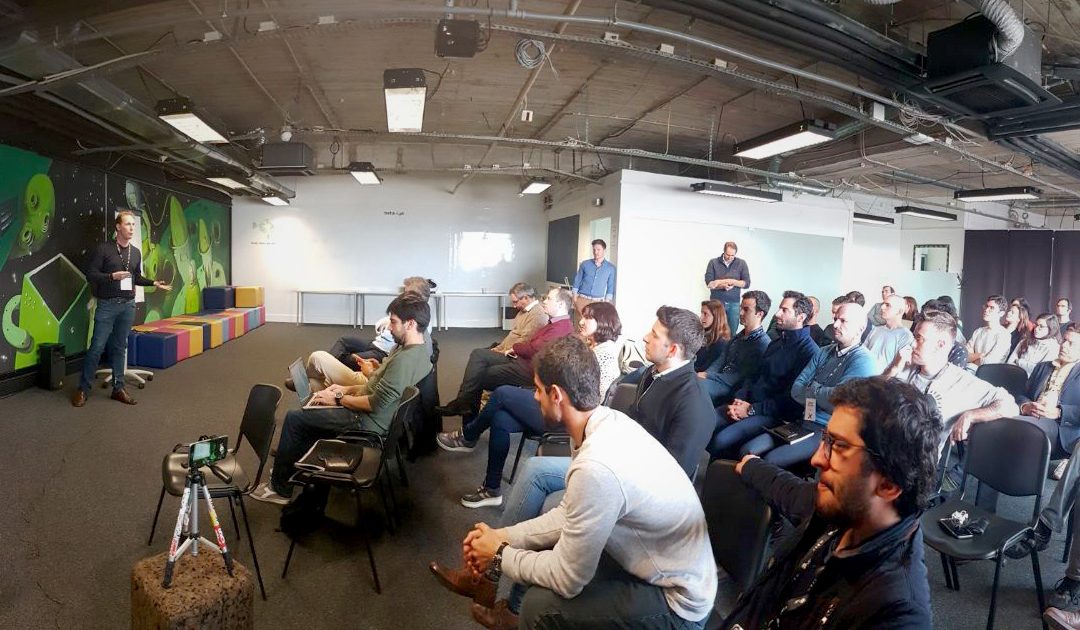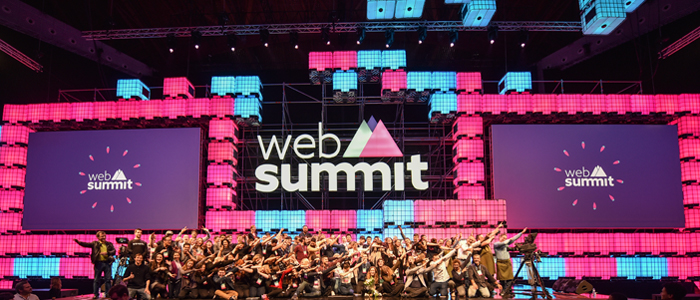
by holiveira | Apr 9, 2018 | Featured, Startups
This year’s edition of the Lisbon Challenge, an ambitious 3 month international acceleration program for tech based startups, is launched today, with 8 startups stepping into the final stage of the program, that already includes investment.
In the applications stage, the program attracted 209 startups, from 45 different countries. In fact, 82% were from out of Portugal, a fact that goes to show you how international Lisbon Challenge is.
The selected startups , for this final stage, are Honest Make (SaaS platform that allows retailers to show and sell their products via conversations with their customers), Predict Churn (Analytics platform to anticipate the possibility of cancellation of a subscription service), SCUBIC (Energy management decision support platform for water utilities), Shareacar (a peer to peer car rental community, kind of the Airbnb for cars), Social Grid (a marketplace that helps brands and agencies finding and managing the right digital influencers, at scale), Triad Health AI (a platform for exercise, health monitoring and daily life activities for Parkinson patients), Wall-i (a web solution to help marketing managers launch digital out-of-home advertising campaigns with real audience and context metrics) and Gofact (Invoicing, Expenses and Bank Accounts, on a single platform).
The program will take place in the next 10 weeks, and is divided in 4 stages: Validation, Product, Growth and Investment. After today’s launch, these are the next milestones:
27 April – Tech Day, powered by Bright Pixel
30 April – Ai Sessions powered by Google
4 May – Product Demo Day powered by CML
6 June – Investors Pitch, at the Lisbon Investment Summit
15 June – Program Finale, powered by Microsoft
“This year, the focus is much more deep tech, since we have a more mature batch of candidates, that allows us to look at more complex and relevant questions, like artificial intelligence. The program migrated from a non-equity format, without any participation or investment, to a fund-driven accelerator, and that also informs our selection strategy”, says Pedro Rocha Vieira, CEO at Beta-i.
The selected startups get 10.000 euros from the start, in exchange for 1,5% of their capital. This money is guaranteed by LC Ventures, that manages over 11 million euros (spread in 2 separate investment vehicles and a risk capital fund), that is co-financed in 3 million euros by Fundo de Capital and Quase Capital, from the COMPETE 2020 e POR Lisboa programs, both linked to the Portugal 2020 initiative, and the European Union, via FEDER.
The other Investment Partners are Red Angels and SONAE/Bright Pixel, but the program also relies heavily on the support of the Lisbon City Hall, Turismo de Portugal, Microsoft and Google, who act as Acceleration Partners.
Lisbon Challenge was first launched in 2013, and in total, more than 200 startups, from 28 countries, have been involved with the program. Our alumni have raised over 65 million euros, and 40% of them got invested.

by holiveira | Nov 22, 2017 | Uncategorized
Say what you will, but the fact is the Web Summit was a huge moment for the Portuguese tech and corporate community. We saw it with our own eyes since 3 of our acceleration programs were parked there.
SIBS PAYFORWARD
The commitment of SIBS with startup interaction was highlighted with the creation of a special Fast Track to the current edition of SIBSPAYFORWARD Accelerator, with applications open until December 15.
The top 3 startups applying for the program at SIBS stand (Pavilion 2) during the Web Summit would immediately secure the opportunity to pitch to SIBS Top Management.
This presence allowed a daily interaction with startups and innovators present at the conference and at the same time, it helped to increase the awareness of the global startup ecosystem for the work being done by SIBS.
Several interviews took place at the stand (see attachment) with program team, mentors, and SIBS collaborators about the program and the way SIBS open collaboration with Startups is contributing to fintech innovation.
Protechting
With 2 programs already done and a new edition kicking-off in 2018 Fidelidade and Fosun chose to be at Web Summit under the Protechting brand. A brand that represents their open innovation bet, and a brand already recognized globally after two successful editions (measured by the collaboration with startups).
This presence was focused on the results from the first two editions and the international reach of the program, that already managed to attract 252 startups from 42 different countries. Namely, at the stand, there were the 5 startups, from 5 different countries, that won those two Editions (LifeSymb – Sweden, Ectosense – Belgium, Visor.ai – Portugal, Bdeo – Spain, Amiko – Italy).
Another focus was to open the door to the upcoming 2018 edition – Startups could make a 1-minute video pitch that served as pre-registration for the new edition. More than 100 startups already pitched their way into 2018 Protechting.
TechCare
This program, that we run with Novartis and Deloitte, offered ‘Alpha’ tickets to all the startups in the TechCare program. They also organized a meetup on the last day of the event, that was more health-focused, to promote networking between the founders and key players in the company.
Above all, the strategic relevance of this connection and presence was evident. We noted the presence, during all 3 days, of several SIBS top collaborators, namely its CEO. We could also spot several Fidelidade managers, topped by its CEO, and also of a high-level Fosun delegation, led by Fosun Group Vice President. During this delegation visit, with Fidelidade CEO also there, the Portuguese Minister of Economy also paid a visit to the stand.
On the other hand, Cristina Campos, CEO at Novartis, was part of the Regulation & Innovation panel, for the health sector, at the Forum. Janneke van der Kamp, Global Head of Product & Portfolio Strategy at Novartis, was a speaker at the Corporate Innovation Summit, and also took some time to drop by the venue.
So, all and all, a strong 3 days for brand exposure, innovation culture, and top-level networking… Pretty much the Beta-i DNA in a nutshell!

by holiveira | Oct 12, 2017 | Corporates
Mind the Bridge and Beta-i, under the Startup Europe Partnership (SEP) initiative, have recently presented the “SEP Monitor Report”, a report that looks at the Portuguese startup ecosystem in depth. “Portugal Rising” was the title of the last SEP Monitor, presented at the end of 2015, and a year and a half later we can now say it was right since Portugal is growing twice as fast as the European average.
The scaleup ecosystem in Portugal is growing and it’s growing fast. In the last year over $130 million dollars of new funding was secured (40% of the total financing raised in the 2010-2016 timeframe), this means Portugal is growing 2 times faster compared to the European average.
Portugal registered 67 scaleups, with $350 million dollars capital raised. If we look a little closer, we can find that Lisbon is the ‘Portuguese Scaleup Hotspot’ responsible for $221 millions of the capital raised, having seen 27 scaleups, 17 exits since 2010 and 38% of new capital raised.
“Of the 17 Portuguese ICT startups that have exited since 2010, 65% have been in the last two years. In absolute terms, Portugal holds 15th place in the ranking of European scaleup ecosystems. While looking at Portuguese figures we need to consider that beyond the relatively smaller size of the Portuguese economy, the ecosystem is quite young. 76% of all scaleups tracked were established after 2010 – the European average is 67% – and almost half of them have been founded after 2013. The majority (88% of total) are small scaleups”, notes Alberto Onetti, Chairman of Mind the Bridge and Coordinator of Startup Europe Partnership.
Ricardo Marvão, Co-founder at Beta-i, added “it’s interesting to note international investors are playing a central role in the scale-up of the Portuguese ecosystem. 62% of capital made available to scaleups – 86% of later stage rounds – comes from abroad. International events such as the Web Summit, the Lisbon Investment Summit, and Scaleup Porto have been incredibly important in advancing the Portuguese scaleup landscape”.
Four out of five of the most funded companies in Portugal are “dual companies”, scaleups founded in Portugal that partially relocated their headquarters abroad while keeping relevant operations in their home country.
Another aspect is that mortality is quite low among Portuguese scaleups. Only 1 scaleup previously tracked has run out of business. The ratio (1.9%) is among the lowest we recorded in Europe. No cases of “early mortality” have been recorded in Portugal (no scaleups founded after 2013 have closed business).
Download the full report:
http://startupeuropepartnership.eu/mapping/
http://mindthebridge.com/research/

by holiveira | Oct 11, 2017 | Corporates
Startup culture has its own language. Many of the terms tossed around sounds like something out of a Sci-Fi movie, or an episode of ‘The Big Bang Theory’, at the very least…
In fact, hearing the language of startups is a lot like watching a foreigner that kind of speaks Spanish trying to have a go at Portuguese. Some words you almost recognize, others you get a sense of what they’re hinting at. But it really doesn’t amount to anything, if you’re looking for your native tongue.
The truth is, most of these terms have come to stay. So there’s really no use in trying to swim against the current and ignore them. The innovative businesses popping up every week, feed and bask in this new ‘lingo’, so, if you want to bring your organization closer to innovation and growth, you better start by understanding what promising startups are actually talking about.
So, to help you get started, here are some key jargon:
Incubator: A space for businesses to research, gestate, and grow before attempting to hit the market. Think about a species of animal that can stand as soon as it is born and then walk and jump 24 hours after. OK, so that is not the type of animal that belongs in an incubator. Incubators are good for seed stage companies, that really need more time and care. Incubators are often also coworking spaces.
Accelerator: An accelerator is much like an incubator, but with more access to resources, mentors, know-how, investors, and corporate connections. In an accelerator, a company might outgrow its natural pace, hence the ‘acceleration’. Accelerators are spaces that have the resources to help a startup fail and try again.
Pitch: A presentation in which a startup founder attempts to persuade an investor about the viability of their company. The presentation varies, based on the specific purpose of the pitch. Brief presentations in which an entrepreneur provides a 30 – 60-second overview of their idea, business model, and marketing strategy, with the purpose of attaining a followup audience with an investor are described as ‘elevator pitches’. Formal, detailed presentations utilizing power point type slide decks, with the specific objective of seeking investment from angel groups or VCs, are known as ‘investment pitches’, and usually, amount to 3 minutes.
Burn Rate: The rate at which a company spends net cash over a certain period, typically a month. Investors are not very keen in putting their money where the burn rate is excessive, apart from some few exceptions, like Uber. In simple words, its how fast startups are blowing the cash they got in the first place.
Seed Money: The first investments in a company by someone other than the founder. The term comes from planting a seed for the first time. This is the initial round of capital for start-up companies, typically provided by angel investors through preferred stock or convertible bond-type instruments.
Unicorn: A company that has magically been valued at over $1 billion (1 million millions). Curated fashion platform Farfetch, founded in Portugal, is one such example. It’s a steep road, but all startups dream of becoming Unicorns…
You are now ready to enter the world of startups. But tread lightly, it a chaotic space, constantly changing and evolving. If you need some guidance, Beta-i is always here to help you navigate the entrepreneurial ecosystem.

by holiveira | Oct 11, 2017 | Corporates
Yes, Porto Business School, Beta-i, Bright Pixel and Lionesa all teamed up to launch REACTOR, an ambitious project that aims to support innovation and entrepreneurship in Oporto. First presented at this year’s “Pixels Camp”, on the 28th of September, REACTOR intends to disrupt corporate innovation, by exposing them to high doses of entrepreneurs and startups, starting next November.
It’s operating base will be the North of Portugal, but the idea is to reach the rest of the country, and the European (and global) market. REACTOR’s main mission will be to promote innovation, bringing corporates, entrepreneurs and startups closer together, and allowing them access to tools as critical as consultancy, acceleration, investment, countrywide and international networks, or community, among others.
Porto Business School will be in charge of the coordination, management, and implementation of the project, very much in line with its current strategy, and all the partners will contribute with their specific know-how and skill set.
For Beta-i, “we see here a clear opportunity to create synergies, not only in the acceleration field, where we can obviously make a difference, but also as a chance to be part of a project with global reach and ambition, in a collaborative system, that will help generate critical mass around the second biggest city in Portugal. This strategy, that’s intended to create positive disruption, in the way we look at the Portuguese innovation map, is very much in line with our goals and mission as an organization, and with our plans for expansion, home and abroad”, comments Pedro Rocha Vieira, CEO, and co-founder at Beta-i.
“REACTOR represents a strong partnership, with the right players, and the proper ingredients to develop a new and ambitious innovation concept, while contributing to the development of a new innovation ecosystem, from Oporto to the world”, he adds.
Lionesa, a creative hub that harbors hundreds of companies and almost 5.000 collaborators, will act as the ‘cradle’ this project. As Lionesa likes to say, “a business that makes nothing but money is a poor business”. Henry Ford quotes still rule!
PS – if you need more information regarding REACTOR, just drop them an email, at reactor@pbs.up.pt.








